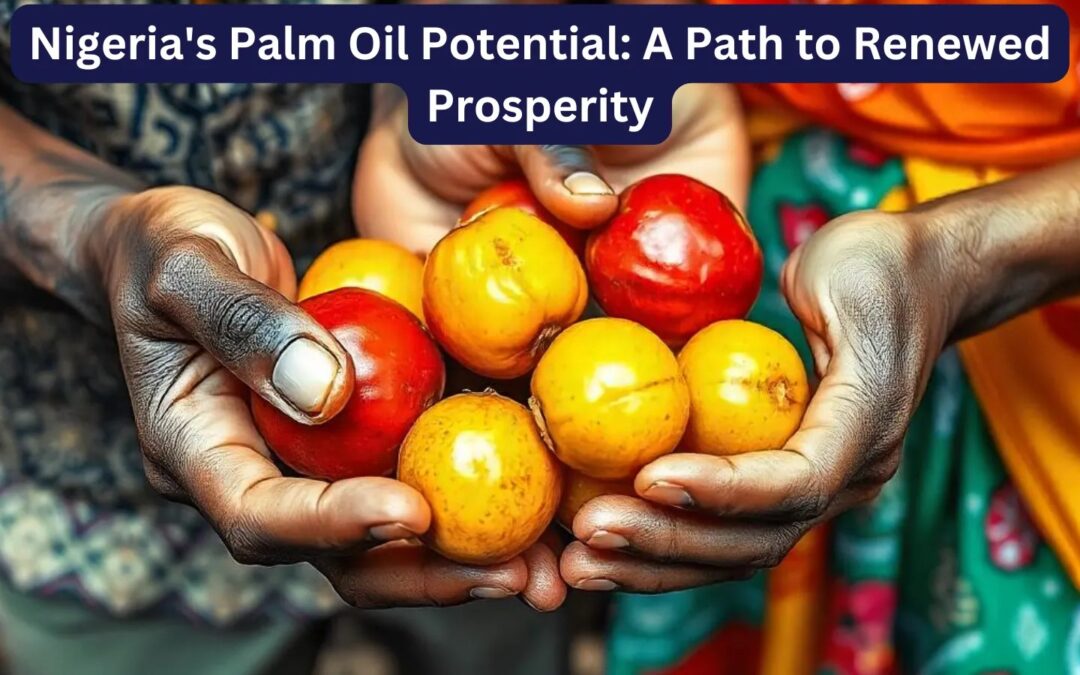Nigeria, once a global leader in palm oil production, now finds itself at the bottom of the global export rankings, with a mere $1.34 million in exports annually. However, the country holds a promising potential to unlock a $10 billion export market in palm oil. This article delves into the current state of Nigeria’s palm oil industry, the challenges it faces, and the strategies being implemented to revitalize it.
WHAT IS NIGERIA’S CURRENT PALM OIL EXPORT STATUS?
Nigeria’s palm oil export status is starkly contrasted with its historical prominence. Despite being a significant producer in the past, the country now ranks 78th globally in palm oil exports. The main destinations for Nigeria’s limited palm oil exports include the United States, Ghana, and Canada. This decline is attributed to various factors, including the civil war era and subsequent lack of investment in the sector
WHY DOES NIGERIA IMPORT SO MUCH PALM OIL?
Despite its potential, Nigeria remains heavily dependent on palm oil imports, primarily from Malaysia, Cote d’Ivoire, and Indonesia. The country imports approximately $372 million worth of palm oil annually, highlighting a significant gap between domestic production and consumption. This imbalance underscores the need for Nigeria to enhance its production capabilities and reduce reliance on foreign imports
WHAT OPPORTUNITIES EXIST FOR GROWTH IN NIGERIA’S PALM OIL INDUSTRY?
The potential for growth in Nigeria’s palm oil industry is substantial. By improving production efficiency, infrastructure, and trade policies, Nigeria can tap into its full export potential and become a major player in the global palm oil market. Key strategies include adopting an agro-industrial cluster approach, distributing high-yield seeds to smallholder farmers, and establishing modern processing facilities closer to farms to enhance oil extraction rates
HOW CAN NIGERIA ACHIEVE ITS $10 BILLION EXPORT POTENTIAL?
Achieving the $10 billion export potential requires a multifaceted approach:
1. Investment in Infrastructure: Developing agro-industrial clusters that integrate essential infrastructure such as seeds, fertilizers, extension services, processing, and storage facilities can significantly boost productivity. This setup can effectively incorporate smallholder farmers within a localized radius, ensuring efficient supply chains
2. High-Yield Seeds and Modern Processing: Distributing high-quality seeds to smallholder farmers can increase yields, while modern processing facilities can improve oil extraction rates from the current low levels to match those of modern mills. This is crucial for enhancing the quality and quantity of palm oil produced
3. Financial Support for Smallholder Farmers: Providing financial resources and extension services to small-scale farmers is essential for transforming Nigeria’s dependence on imported palm oil into self-sufficiency and export capability
4. Strategic Trade Policies: Implementing favorable trade policies can facilitate smoother export processes and encourage foreign investment in the sector. This includes negotiating better trade agreements and reducing bureaucratic barriers to export
WHAT ROLE DOES SUSTAINABILITY PLAY IN PALM OIL PRODUCTION?
While palm oil production offers economic benefits, it also poses significant environmental and social challenges. The expansion of oil palm cultivation has led to deforestation, biodiversity loss, and greenhouse gas emissions in major producing countries like Indonesia and Malaysia. In Nigeria, adopting sustainable practices and certification schemes can help mitigate these impacts and ensure that the industry’s growth is environmentally responsible.
HOW CAN NIGERIA BALANCE ECONOMIC GROWTH WITH ENVIRONMENTAL SUSTAINABILITY?
Balancing economic growth with environmental sustainability in palm oil production involves several strategies:
1. Certification Schemes: Implementing certification schemes like RSPO (Roundtable on Sustainable Palm Oil) can ensure that palm oil production meets rigorous environmental and social standards, enhancing the marketability of Nigerian palm oil globally
2. Sustainable Land Use Practices: Encouraging sustainable land use practices that avoid deforestation and promote biodiversity conservation can help mitigate environmental impacts while maintaining economic viability
3. Community Engagement: Engaging local communities in the decision-making process and ensuring fair labor practices can address social concerns associated with palm oil production
CONCLUSION
Unlocking Nigeria’s $10 billion palm oil export potential requires a comprehensive approach that addresses production efficiency, infrastructure development, and sustainability. As the global demand for palm oil continues to rise, Nigeria has a unique opportunity to reclaim its position as a major player in the industry. For businesses and individuals interested in tapping into this potential, understanding the intricacies of the palm oil export market is crucial.
To learn more about how to navigate the complexities of international trade and unlock export opportunities, register for our upcoming export training at www.microvarsity.com/meta. This training will equip you with the knowledge and skills needed to capitalize on emerging markets and grow your business in the global trade arena. Take the first step towards transforming your business today!

